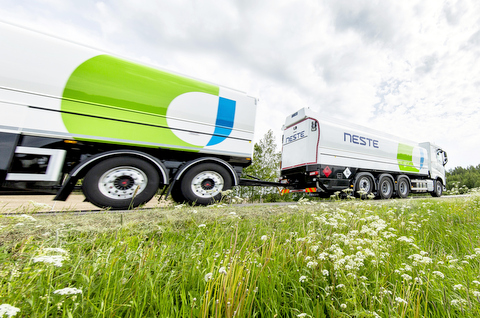Reducing GHGs in the Transport Sector
Did you know that the transportation sector is the largest contributor of greenhouse gas (GHG) emissions in the U.S.? With that in mind, the need to accelerate the phase-out of fossil fuels and transition to a more sustainable transportation system is more prominent than ever.

Recognizing the need to create a healthier planet, many American cities and businesses have set bold ambitions to reduce their carbon footprint and environmental inequity. There is no silver bullet for kicking the fossil fuel habit because what works for one type of vehicle will not work for another. For example, electrification makes sense for passenger cars, but is not currently available at scale for long-haul heavy-duty trucks or aircraft.
In the U.S., there are more than 13.5 million medium- and heavy-duty trucks in service today and most of them rely on fossil fuels. These vehicles are responsible for moving 72% of all the goods we consume—such as the orders we place on Amazon that are later delivered to our doorstep, or the fresh groceries we buy from the local markets—but they burn over 44 billion gallons of diesel fuel every year, emitting 432 million metric tons of GHG emissions.
Figuring Out Where to Start
But, reducing emissions from these vehicles—and knowing where to start—can be a challenge in itself. Our communities and planet can’t afford to wait—we need “today solutions” to cut GHG emissions from these vehicles. Thankfully, renewable diesel offers a drop-in solution that delivers immediate environmental benefits and requires zero new investments. Over 20 years ago, Neste developed the technology to produce renewable diesel; now, Neste’s renewable diesel is made from sustainably sourced renewable raw materials such as used cooking oil and animal fat from food industry waste.

Over the lifecycle of the fuel, Neste’s renewable diesel can reduce GHG emissions up to 75%[1] compared to fossil diesel. Even better, some cities and businesses are taking a step further to create a circular economy, so their vehicles can run on renewable diesel made from their own waste.
As part of my work with Neste, we are helping provide American cities with easy access to lower emission, drop-in fuel that works seamlessly with existing vehicles and fueling infrastructure. By partnering with local businesses to deliver renewable fuels and products where and when companies need them, we are coming up with creative new tools that allow businesses to support and benefit from renewables even where they are not available.
The U.S. has relied on fossil fuels to power transportation for over 150 years. We need to make our transportation system more sustainable with today solutions as city residents, investors, employees or customers demand action on climate change. Choosing to use renewable raw materials as a resource and making the switch to renewable diesel is a simple way to divest from fossil fuels and a cost-effective step for cities to take to fight climate change. By creating a circular economy every vehicle, every piece of equipment, and every restaurant in cities can be a part of the solution that helps combat, not contribute, to climate change.
[1] Lifecycle greenhouse gas emission reductions compared to fossil diesel and based on current feedstock pathways. Calculation method complies with the LCFS CA-GREET 3.0.

1 thought on “<strong>How renewable diesel can help fight climate change</strong>”